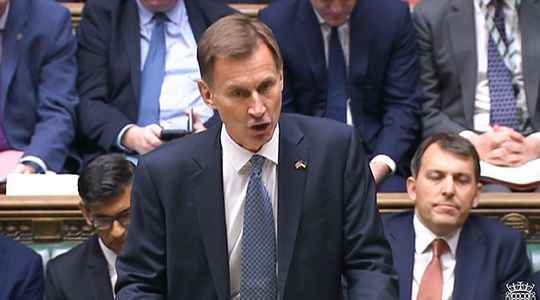A rare developed country not to have returned to its pre-Covid level of GDP, the United Kingdom and its new government, led by Rishi Sunak, unveiled its budget in Parliament this Thursday, November 17. With the joint objective of fighting inflation – currently at 11% – reassuring the markets, rebalancing public finances and not worsening the recession announced for 2023 by the public budget forecasting body, the OBR, the measures adopted have, unsurprisingly, austerity for guideline. Before presenting the details of the plan, the Chancellor of the Exchequer, Jeremy Hunt, even enacted in a triptych the government’s objective: “Stability, growth, public services”.
The United Kingdom intends to implement a “budgetary consolidation”, in other words to make savings, up to 55 billion euros. To do this, it plans to increase revenue from taxes of 25 billion euros, in particular by placing “the heaviest burden on the richest”, in the words of Hunt. Thus, the threshold passing a taxpayer into the highest bracket is lowered from 150,000 to 125,000 pounds earned per year. Nearly 250,000 people are affected by this changeover. In order to increase tax revenue, the government will also take advantage of inflation, by freezing the tax thresholds on income, those on inheritances and those on contributions paid to Social Security.
Energy giants in the crosshairs
Taking advantage of the war in Ukraine and the increase in energy prices, the major companies in the sector will have to go to the cash register. A tax on energy giants will be introduced, increasing the financial contribution of these companies from 25% to 35% until 2028. In addition, a temporary tax of 45% is planned for electricity producers. In this same area, Jeremy Hunt foresees a road tax on electric vehicleslike what exists for thermal cars.
If a little less than half of the announced savings will depend on taxes, the rest will come from a drastic reduction in expenditure. With the exception of Health, Education and Defence, the other ministries will see their budgets closely watched. The increase in their spending will slow over the next five years, until they generate £30 billion in savings. Those of National Education and Health are therefore exempt, even seeing their budgets increased by 2.3 billion and 3 billion pounds respectively. As for Defense, it will remain at its current level, due to the aid paid to Ukraine.
The government will make savings by reducing the aid allocated to households having difficulty paying their energy bill. Indeed, a household will be able, from next April, to pay up to 3,000 pounds per year, against 2,500 currently. However, the most vulnerable will not be left behind. On the contrary. The United Kingdom has chosen to revalue allowances and retirement pensions by 10.1% in 2023, in order to adjust them to inflation. The minimum wage will increase by 9.7%, while the increase in rents in social housing will be capped at 7%. But all these measures will only take place in April 2023. This is enough to keep the poorest worried about the months to come.
